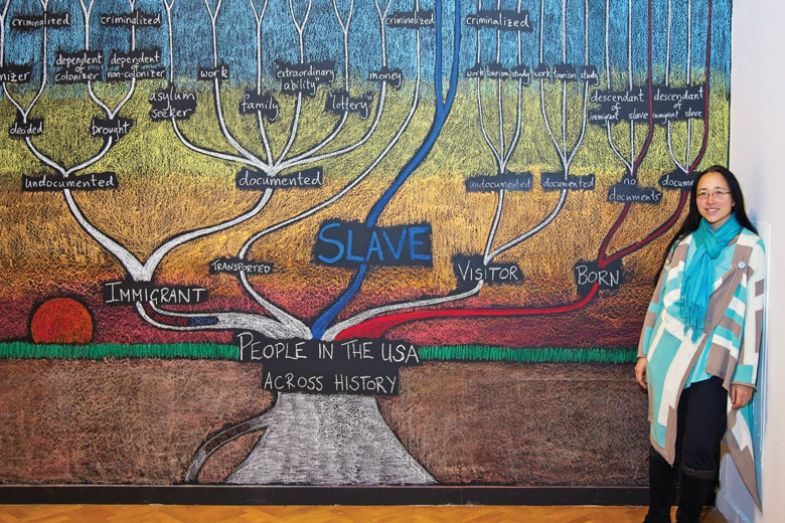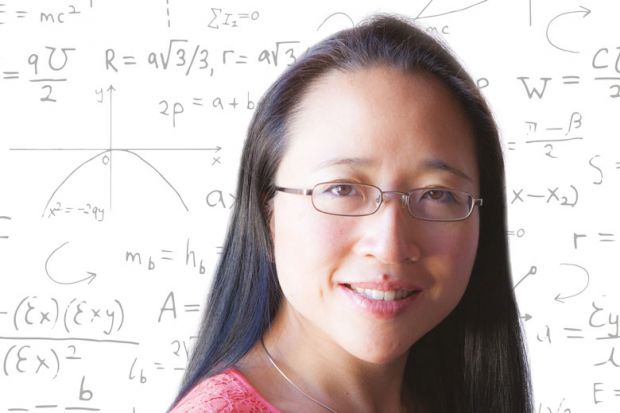“Pure maths is a place of dreams,” writes Eugenia Cheng in her new book, x + y: A Mathematician’s Manifesto for Rethinking Gender. “It’s about dreaming up new concepts and new structures.”
Such dreams, as her subtitle suggests, are not just intellectual games but can help us address complex and intractable real-world issues. And she draws on the story of her own career to illustrate how.
Scientist-in-residence at the School of the Art Institute of Chicago since 2013, Cheng was previously senior lecturer in pure mathematics at the University of Sheffield. Her first two books – How to Bake Pi: Easy Recipes for Understanding Complex Maths and Beyond Infinity: An Expedition to the Outer Limits of Mathematics – provided wonderfully accessible introductions to some pretty challenging ideas.
The first, which includes recipes for custard, chocolate brownies and fruit crumble, was strongly influenced by her teaching experience. “When I was in Sheffield,” Cheng tells Times Higher Education, “the thing which perked my students up the most was talking about food. And so I used it more and more.”
When she moved to Chicago, however, many of her art students had “either failed previous levels of maths or ran away from it because they hated it”. She knew she would have to adjust her teaching style but made the remarkable decision to bring into her classes her own research field of higher-dimension category theory, normally taught only to maths specialists at postgraduate level.
“I’m now teaching more advanced maths in a slightly less rigorous way,” she says, “whereas at Sheffield I was teaching less advanced maths slightly more rigorously…[The art students] are not so interested in that level of rigour but the thought processes and the ideas behind it.”
Such an approach challenges the conventional idea that maths is basically “cumulative” and consists of “increasingly high hurdles, where you are tested to see if you can pass this hurdle and then are allowed to progress to the next”. Unfortunately, this only serves to “keep people out”. As someone committed to overcoming “maths phobia”, she is always looking to break down such barriers.
What Cheng has also discovered at the Art Institute is that discussions of food “didn’t make [students there] perk up in the same way”. Instead, “it was questions of social justice and political issues which really motivated them…I had been very wary of talking about politics out loud up until then because, like most mathematicians, I had thought maths was supposed to be very neutral – and then [with the 2016 US presidential election] it became too important…If I ask my students to stop thinking about politics when they walk into the classroom, they are not going to be interested in anything I’m saying.”
Cheng’s third book, The Art of Logic: How to Make Sense in a World that Doesn’t, published in 2018, already drew on her new, more politically engaged style of teaching, illustrating logical points with examples about white privilege, sexual harassment and fat shaming. She has now taken this several steps further. x + y is a book very much designed to change the world.
So where does gender come in?
In parallel with her teaching, research and public engagement work, Cheng – as a prominent female mathematician – is often asked to take part in discussions about getting more women into maths and science. Yet she often finds herself at odds with the consensus view.
“The other women on those panels”, she reports, “typically exhort everyone: ‘You have to step out of your comfort zone! You have to take risks! You have to be OK with failure!’ But I know there are many young women, and men as well, who don’t feel they want to do those things, and so they will be put off and decide they are just not cut out for [certain disciplines].” A more productive approach, she suggests, relies on “building safety nets, having a network of supporters around you and defining failure out of existence by saying everything is a learning process. It is just a shift in psychology.”
Similarly, x + y cites a study from the 1990s into why men did better than women in Oxbridge exams. In subjects such as history, it turned out, one important factor was that “men tended to write essays that took a strong position and argued it fiercely, and that this was highly valued. A balanced position argued from all points of view was valued less.”
One possible response, of course, is to “train women to make more one-sided arguments”. But this is an example of what x + y describes as “pseudo-feminism…in which women are exhorted to become more like men in order to be successful”.
A central problem, Cheng writes, is that debates about gender often turn into “an argument about what we should be arguing about”. It is easy to get lost in endless, dizzying disputes about whether a particular piece of research really demonstrates that men are statistically “better at systematising than empathising” and, if so, whether this is innate and whether it is a reliable proxy for “better at maths”.
What this fails to address is that certain characteristics – such as taking a strong but perhaps simplistic position in an essay – may be associated with men (for whatever reason) and favoured by society, which then leads to men being more successful. Yet we also need to ask whether such attributes are actually desirable. In the case of the Oxbridge exams, as Cheng points out, we might consider the impact on our political culture: should “politicians be judged by how well they make a speech” or “how well they listen to other people’s concerns and respond to them”?
If we decide such characteristics are not desirable and we therefore work to promote other values, that will not only benefit society in itself but also help alter the gender balance of power without the need for quotas, “leaning in”, assertiveness training for women or many other familiar forms of intervention.
It is here that Cheng adopts the mathematician’s privilege of inventing “a new dimension” and terminology. She uses the word “congressive” to refer to forms of education, research, discussion and behaviour that “focus on society and community over self”, “tak[e] others into account more than impos[e] on them” and “emphasis[e] interdependence and interconnectedness”. “Ingressiveness”, by contrast, means “focusing on oneself over society and community”, and, among other things, involves a “tendency towards selective or single-track thought processes”.
Having this bold new conceptual framework, in Cheng’s view, has helped her analyse everything from teaching methods to voting systems without bringing in the baggage (and gendered assumptions) of words such as “competitive” and “cooperative”. In teaching maths the way she now does in Chicago, we read, she has been able to “develop a little utopia of a congressive society in my classroom”. And to create a wider climate of gender equality, while we certainly need to address overt sexism and discrimination, the real key is to make the world more congressive, she says, rather than seeking to alter women or making special allowances for them, via a process of “‘reverse sexism’, in which women are deliberately favoured to make up for past oppression”.

Sunset on the American Dream, by Eugenia Cheng, at the Chicago Cultural Center © Paul Crisanti
Although ranging widely across many aspects of our lives, the book also slaughters a number of specifically academic sacred cows, including journal publishing and peer review. Cheng believes she has experienced “being held to a different standard than my male peers in refereed reports”. And while she “just quietly lament[s] in a corner” when she feels her work should have been cited in a paper, she often receives communications from male mathematicians who are “angry because I didn’t cite them. It’s quite unpleasant, so I think about who might get angry [when deciding who to cite], which means I’m skewing my own citations.”
Further distortions arise from the fact that “people who are principled decline to read papers written by their friends, whereas unprincipled people are willing to review their friends”. It was also depressing when famous authors seemed to have little difficulty in getting substandard work published, “exactly like what happens in the pop music world, which shouldn’t happen in academia because we are supposed to be rational”.
But despite the biases they can introduce, don’t editors and reviewers also perform an important function in excluding really bad papers?
“The usefulness of gatekeepers could be preserved while removing the problems,” Cheng replies, “by making it less of a gate and more of a slope. The all-or-nothing aspect makes it really problematic: the idea that keeping people out makes things better. It’s a bit like false positives and false negatives. We may be keeping something out that was worth letting in – and I think that’s much more problematic than the other way round, the fear of letting something in that wasn’t worth it.
“I don’t object to experts evaluating other people’s papers, but peer review is based on something completely anachronistic…The cut-offs are based on how much space there is in a journal, even though now everyone reads everything digitally.”
These are not easy times to be optimistic, particularly for those seeking more congressive forms of politics. Yet Cheng finds a sliver of hope in the way that “people have had to start really thinking about what is happening with exams and entry into universities”. For instance, in the US, the SAT college admission test did not run this year; for Cheng, the halting of standardised testing requirements for university applications “is an amazing result. There are people who have been saying they should do that for years. It’s a pity it took a global pandemic to drop them, but maybe [admissions tutors] will realise that there are ways they can decide who should go to university without [making applicants sit] through epic multiple-choice, completely pointless tests.”
Looking further forward, does Cheng foresee a utopian world dominated by congressive behaviour and institutions – or will congressive and ingressive forces always have to battle it out against each other?
“I personally don’t feel any need to be ingressive any more,” she reflects. “I can’t think of any reasons why ingressive behaviour is important. It’s inevitable that there will always be some, just as there will always be morons. But we can try to get people to be less moronic and more congressive.”
Eugenia Cheng’s x + y: A Mathematician’s Manifesto for Rethinking Gender has just been published by Profile Books.
Register to continue
Why register?
- Registration is free and only takes a moment
- Once registered, you can read 3 articles a month
- Sign up for our newsletter
Subscribe
Or subscribe for unlimited access to:
- Unlimited access to news, views, insights & reviews
- Digital editions
- Digital access to THE’s university and college rankings analysis
Already registered or a current subscriber? Login










